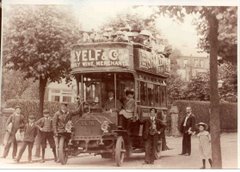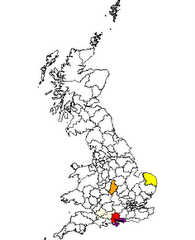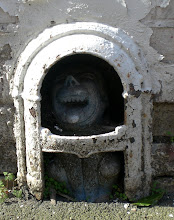
I've transcribed the archive document mentioned in yesterdays entry and you can read it below. However as it's an awful lot of text I thought I'd include a photograph that my brother took some years ago in the foyer of Yelf's Hotel in Ryde. Although not particularly clear it shows some cheques written by Robert Yelf. My brother was later able to buy a number of other of Roberts cheques on ebay and it might be interesting to post up the details if I can get hold of them. As is apparent from the transcript below he wasn't short of a bob or two!
_______________________________________
"THE YELF ARCHIVE - This collection was deposited in 1982 by William V. Pearce, 53A Union Street, Ryde.
Robert Yelf was born in 1761, the second son of John Yelf. Robert married first Ann Goodall (d.1812) and secondly Jane Wavell, widow. He died 15 April 1834.
Robert first came to Ryde in 1794, when upon the death of Miss Margaret Collier, he took over her cottage in Upper Ryde. He was an executor of Miss Collier’s will and there was a connection with the Goodall family. In 1800 he took a lease upon some property on the west side of Union Street. He opened a business selling wines, spirits and tobacco in 1801 (YEL/A/1). At the same time he rented the hotel next door for £75 per annum from John Cooper, brewer, of Ryde. In 1804 Robert purchased the hotel and outbuildings for £2,200. (YEL/A/1)
In 1805 Robert had a Tap Room built at the hotel at a cost of £468, and in the following year had new stables and coach houses built. Mrs Jacob’s dwelling house (George Street) was purchased in 1807 for £345 and in 1809 it was rebuilt using stone taken from Puckpool Cliffs.
After a rest of some eleven years, Robert Yelf continued his expansion by purchasing in 1820 for £123, the carriage house, cottage and land of Thomas Bush, Cross Street. In 1827 new coach houses and stables were built on the site. Clifton Cottage, Upper Ryde was purchased in 1821 for £203, and became the house of Robert Yelf. In 1824 a cottage in West Street was purchased for 215 and £350 was spent on it. A house called ‘Shattons’ was purchased in 1830 for £800(?) and in the following year Robert had a house built on Union Street, adjoining (?)detts, for a post office, at a cost of £435. (YEL/A/1)
In addition to his town property, Robert had considerable farming interests. At one time he held Mumhouse Bargain, including West Field, which he later disposed of to Earl Spencer in 1810. Little Haylands came into Robert’s hands in 1801 and by the time of his death in 1834 he farmed Whitefield, Millhouse, Haylands and Play Street farms. (Yel/B/1)
The business and farming interests passed to his eldest son, Robert Yelf, junior, who in 1822 married Sarah Mew, and died 21 November 1882 aged 85 years.
The main series of cashbooks (YEL/C/- and YEL/D/-) were introduced when Robert Yelf, junior took over. The son had been taken into the business prior to his father’s death and had in 1832 reached an agreement with the Postmaster-General to carry the Royal Mail between Ryde and Newport. In 1836 this slide of his interests expanded further with him starting a stage-coach service from Ryde to Ventnor. The stage-coach was called “Felicity” and ran daily, Sundays excepted, until the coming of the railway in August 1864. The coach was sold to Thomas Vanner, who ran a stage-coach service from Ryde to Newport, for a total of £40. The Bought ledger (YEL/K/4) shows the stage-coach receipts for 1861-64 and the Letter book (YEL/M/1) gives details of the stage-coach duty payable under Act 2 & 3 Victoria, CAP. 66, 6 Oct 1839. Most of the receipts and expenditure concerning posting and stage-coach working were accounted for under “Hay and Crops”.
Sturbridge House was built for Robert Yelf, junior, from 1861 to designs by Thomas Hellyer, architect. (YEL/K/4)
No accounts for the hotel appear to have survived but about 1862 the hotel was disposed of to John Wavell. In 1874 Robert sold Sturbridge House to Sir William (?)utt and moved to Uplands, Bullen Cross, near Ryde, which remained his home until his death.
The accounts have been listed in the collection to try to show the various sections of the Yelf’s business. The bulk of the collection deals with the selling of wines and spirits. (YEL/C/- and YEL/D/-). In an effort to deal with wine and spirit deliveries to houses let on very short leases, Robert Yelf, junior, introduced ledgers headed and indexed under the address (YEL/G/1-3). At the same time he had another ledger headed and indexed under the surname, for customers who were thought to be resident in the town (YEL/F/4-10)
The farming and property interests of Robert Yelf, senior, are to be found in YEL/A/1 and YEL/B/1, those of his son are contained in YEL/D, YEL/J and YEL/K. The Farming Record and Account Books (YEL/?/1-4) give details of cropping, labourers and wages on the farm.
The letter books (YEL/M/1-10) are a near unbroken run from 1832 to 1877 and give a good insight into the wine and spirit business of the 19th century.
The Account of the Receipts etc., by the executors of the late R. Yelf (YEL/L/1) are very helpful when trying to sort out the various interests of Robert Yelf, senior.
The odd item in the collection is YEL/N/1, which is the valuation of the property in the parish of St. Helens. It is thought to be in the collection as Robert Yelf, junior, was a Guardian of the Poor.
After the death of (Robert Yelf, junior?) in 1882 it would appear that the business was disposed of and toward the end of the 19th century came into the hands of W. Pearce (YEL/K/2), a decendant (of whom posited?) the collection."




1 comment:
just incase anyone has come across this page as I did.. Sturbridge House is now named Apply Manor and it runs as a restaurant.. there is a write up on thier Facebook page about Robert Yelf having it built.
Post a Comment